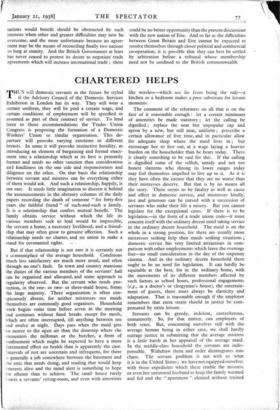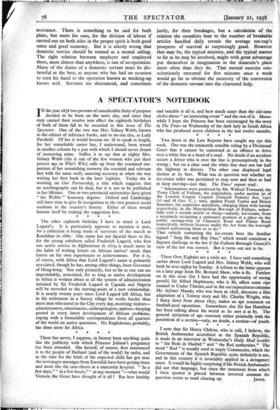CHARTERED HELPS
THUS will domestic servants in the future be styled if the Advisory Council of the Domestic Services Exhibition in London has its way. They will wear a certain uniform, they will be paid a certain wage, and certain conditions of employment will be specified or assumed- as part of their contract of service. To lend force to those recommendations the Trades Union Congress is proposing the formation of a Domestic Workers' Union or similar organisation. This de- parture will provoke varying emotions in different breasts. In some it will provoke instinctive hostility, as introducing an element of bargaining and formal enact- ment into a relationship which at its best is primarily human and needs no other sanction than consideration and kindliness on the one side and responsiveness and diligence on the other. On that basis the relationship between servant and mistress can be everything either of them would ask. And such a relationship, happily, is not rare. It needs little imagination to discern it behind the announcements in the obituary columns of the daily papers recording the death of someone " for forty-five years the faithful friend " of such-and-such a family. It is a relationship that confers mutual benefit. The family obtains service without which the life its various members seek to lead would be impossible, the servant a home, a necessary livelihood, and a friend- ship that may often grow to genuine affection. Such a relationship needs no charter, and no union to make a stand for covenanted rights.
But if that relationship is not rare it is certainly not a commonplace of the average household. Conditions much less satisfactory are much more usual, and often through no one's fault. In town and country mansions the duties of the various members of the servants' hall can be organised and allocated, and some approach to regularity observed. But the servant who needs pro- tection, in the one- or two- or three-maid house, forms the large majority. There organisation is often con- spicuously absent, for neither mistresses nor maids themselves are commonly good organisers. Household work begins some time before seven in the morning and continues without fixed breaks except for meals, which are often interrupted, till anything between ten and twelve at night. Days pass when the maid gets no nearer to the open air than the doorstep where she encounters the milkman or the butcher, a form of confinement which might be expected to have a more detrimental effect on health than is apparently the case. Intervals of rest are uncertain and infrequent, for there is generally a job somewhere between the basement and the attic that needs doing, and reading that would keep interests alive and the mind alert is something to hope for oftener than to achieve. The small house rarely boasts a servants' sitting-room, and even with amenities like wireless—which are far from being the rule—a kitchen or a bedroom makes a poor substitute for leisure moments.
The comment of the reformers on all that is on the face of it reasonable enough : let a certain minimum of amenities be made statutory ; let the calling be dignified ; replace the neat but unpopular cap and apron by a new, but still neat, uniform ; prescribe a certain allowance of free time, and in particular allow for adequate sleep where the maid lives in ; but encourage her to live out, at a wage laying a heavier burden on the householder than he bears today. There is clearly something to be said for this. If the calling is dignified some of the selfish, untidy and not too honest slatterns who throng its lower ranges today may feel themselves impelled to live up to it. As it is they have often the excuse that they are no worse than their mistresses deserve. But that is by no means all the story. There seems to be fatality as well as cause and effect in domestic service, and mistresses kindly, just and generous can be cursed with a succession of servants who make their life a misery. But you cannot legislate for the exceptional cases. If there is to be legislation—in the form of a trade union code—it must concern itself with the ordinary decent maid taking service in the ordinary decent household. The maid is on the whole in a strong position, for there are usually more mistresses seeking help than maids seeking situations ; domestic service has very limited attractions in com- parison with other employments which leave the evenings free—no small consideration in the day of the sixpenny cinema. And in the ordinary decent household there ought to be no need for legislation. It can hardly be equitable at the best, for in the ordinary home, with the movements of its different members affected by such factors as school hours, professional engagements (e.g., in a doctor's or clergyman's house), the entertain- ment of guests, there must always be elasticity and adaptation. That is reasonable enough if the employer remembers that extra strain should in justice be com- pensated by extra leisure.
Servants can be greedy, indolent, cantankerous, unmannerly. So, for that matter, can employers of both sexes. But, concerning ourselves still with the average human being in either case, we shall hardly outrage justice in submitting that the average mistress is a little harsh in her appraisal of the average maid. In the middle-class household the servants are indis- pensable. Withdraw them and order disintegrates into chaos. The servant problem is not with us what it is in the United States ; we have not equipped ourselves with those expedients which there enable the mistress or even her untutored husband to keep the family warmed and fed and the " apartment " cleaned without trained said for both assistance. There is something to be . plans, but more for ours, for the division of labour if carried out on both sides in the proper spirit is both good sense and good economy. But it is utterly wrong that domestic service should be treated as a menial calling The right relation between employer and employed there, more almost than anywhere, is one of co-operation. Many of the duties of a domestic servant must be dis- tasteful at the best, as anyone who has had on occasion to turn his hand to the operation known as washing-up knows well. Servants are denounced, and sometimes justly, for their breakages, but a calculation of the relation the casualties bear to the number of breakable articles handled daily reveals the average tea-cup's prospects of survival as surprisingly good. However that may be, the typical mistress, and the typical master so far as he may be involved, might with great advantage put themselves in imagination in the domestic's place more often than they do. That mental exercise con- scientiously executed for five minutes once a week would go far to obviate the necessity of the conversion of the domestic servant into the chartered help.















































 Previous page
Previous page